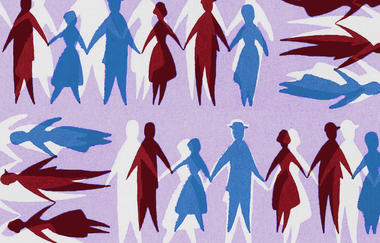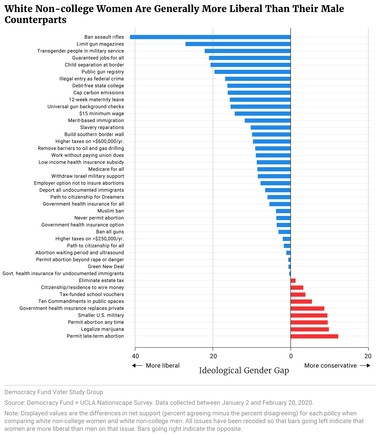Elections, Race & Ethnicity, Socio-Economic

The 2016 presidential race was perhaps the most surprising electoral upset in living memory. In its aftermath, political analysts spent a great deal of time weighing explanations for how Donald Trump won. While a variety of factors led to the election outcome, it is clear that shifts among white non-college voters, particularly those in the Midwest, played a crucial role.
If Trump is able to hold his coalition together in 2020 — including his support among these white non-college voters — it greatly increases his chances of winning. However, there are indications that serious cracks have emerged among women in this group.
As Ronald Brownstein notes in The Atlantic, focus group interviews have suggested that white non-college women are more concerned than men about Trump’s language on immigration and were also less likely to think that the economy had delivered for their family. Similarly, other polling has shown white non-college women to be both lukewarm on Trump and more supportive of some of the policies that have been offered by Democratic presidential candidates.
More than 193,000 interviews conducted to date by the Democracy Fund + UCLA Nationscape™ survey shed light on these differences. Since July 2019, respondents have been asked about dozens of policies on a weekly basis as well as questions about how they intend to vote in 2020. These data show gender divides among white non-college voters that manifest as both policy differences and different electoral choices.
Looking at data collected since the beginning of the year, white non-college women are more likely to hold liberal positions than their male counterparts across a wide variety of issues.(1) Asked about their preference for a “smaller government that provides fewer services” or a “larger government that provides more services,” white non-college women were more likely than their male counterparts to prefer a larger government (49 percent vs. 37 percent).
This relationship holds when we ask about more specific issues as well. For example, almost six in 10 (57 percent) of white non-college women support raising the minimum wage to $15 an hour while just 28 percent oppose such a policy — a net support of +29 percentage points. By contrast, the net support among white non-college men is about half (+15 percentage points) of that.
White non-college women are also more likely than white non-college men to support an assault weapon ban (+38 vs. -4), a government registry of gun ownership (+27 vs. +6), and limits on gun magazine sizes (+27 vs. +0); more likely to support paid maternity leave (+51 vs. +35), debt-free college (+28 vs. +12), a path to citizenship for Dreamers (+51 vs. +46) and raising taxes on families making over $600,000 (+48 vs. +37).
On the other hand, white non-college women and men are relatively united on some issues — such as opposing government-financed health insurance for immigrants who enter the United States illegally (-59 vs. -59) and banning gun ownership (-69 vs. -73). In fact, white non-college women are even more conservative leaning than men on some issues like abolishing private health insurance for a government run program (-31 vs. -22).
(1) Estimates throughout this post are based on over 14,000 interviews conducted between January 2 and February 20, 2020 of white non-college Americans who say they are registered to vote.
Figure 1

Moving from policy to politicians, we see the same pattern — white non-college women are less likely to support President Trump than their male counterparts. Among registered voters, white non-college women are less likely than men to approve (51 percent vs. 58 percent) and more likely to disapprove (47 percent vs. 39 percent).
Though the 2020 general election is still months away, early signs suggest that this disapproval will translate into a lower level of support at the ballot box. In a matchup of Donald Trump against Joe Biden, the net support of white non-college women (+7 Trump) is lower than it is among men (+21 Trump). These results are similar if Bernie Sanders is substituted for Joe Biden (+8 Trump and +19 Trump, respectively). Polling data in the last several years have repeatedly indicated that white non-college women are a less stable piece of Trump’s coalition. The data collected by the Nationscape survey strongly confirm this assessment.
Subscribe to our mailing list for updates on new reports, survey data releases, and other upcoming events.